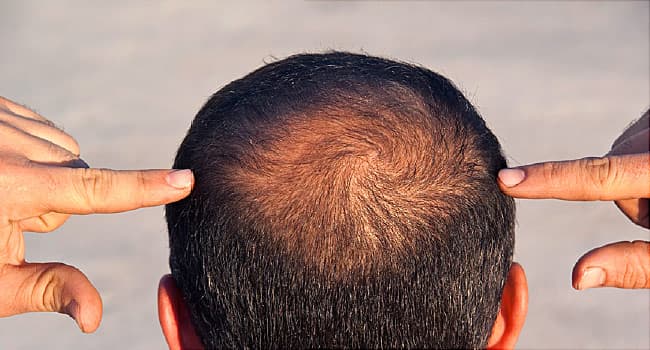Can Xanax Cause Baldness?

Baldness typically refers to excessive hair loss from your scalp. Each strand of hair sits in a tiny hole in the skin called a follicle. In general, baldness occurs when the hair follicle shrinks over time, resulting in shorter and finer hair. Eventually, the follicle does not grow new hair. The follicles remain alive, which suggests that it is still possible to grow new hair.
On average, people lose anywhere from 50 to 100 hairs each day. This is normal. More than 50 percent of women experience balding. By 50 years of age, about 85 percent of men are balding, according to the American Hair Loss Association (AHLA).
What is Xanax?
Xanax is a brand of alprazolam a benzodiazepine that works by enhancing the activity of certain neurotransmitters in the brain. Generic Xanax is also available as the brand-name medications Xanax and Xanax XR. A generic drug is an exact copy of the active drug in a brand-name medication. Generic blue, green, and yellow Xanax are considered to be just as safe and effective as the original drug but tend to cost less.
Xanax is prescribed for the treatment of anxiety disorders and anxiety caused by depression. Xanax is also used to treat panic disorders with or without a fear of places and situations that might cause panic, helplessness, or embarrassment (agoraphobia).
Xanax is a federally controlled substance (C-IV) because it can be abused or lead to dependence. Xanax should be kept in a safe place to prevent misuse and abuse. Selling or giving away Xanax may harm others, and is against the law. Tell your healthcare provider if you have abused or been dependent on alcohol, prescription medicines, or street drugs.

Can Xanax Cause Baldness?
Yes, studies have linked Xanax to hair loss and baldness. Alopecia areata has been reported among people who take Xanax, especially women, 60+ old, who have been taking the drug for 10+ years. Out of the 115,418 people who reported side effects when taking Xanax, 7 people (0.01%) have Alopecia areata.
Anxiety and stress can cause hair loss to continue leading to different patches of hair and baldness. Drug-induced hair loss is usually completely reversible and is, in most cases, a consequence of a toxic effect of the drug on the hair follicle matrix. In rare cases, alopecia may be permanent.
What are the possible side effects of Xanax?
Xanax may cause some unwanted effects. Although not all of these side effects may occur, if they do occur they may need medical attention.
Check with your doctor immediately if any of the following side effects occur:
More common
• Being forgetful
• changes in patterns and rhythms of speech
• clumsiness or unsteadiness
• difficulty with coordination
• discouragement
• drowsiness
• feeling sad or empty
• irritability
• lack of appetite
• lightheadedness
• loss of interest or pleasure
• relaxed and calm
• shakiness and unsteady walk
• sleepiness
• slurred speech
• tiredness
• trouble concentrating
• trouble performing routine tasks
• trouble sleeping
• trouble speaking
• unsteadiness, trembling, or other problems with muscle control or coordination
• unusual tiredness or weakness
Less common
• Blurred vision
• body aches or pain
• burning, crawling, itching, numbness, prickling, “pins and needles”, or tingling feelings
• changes in behavior
• chills
• clay-colored stools
• confusion about identity, place, and time
• cough
• dark urine
• decrease in the frequency of urination
• decrease in urine volume
• diarrhea
• difficult or labored breathing
• difficulty in passing urine (dribbling)
• difficulty with concentration
• difficulty with moving
• dizziness, faintness, or lightheadedness when getting up suddenly from a lying or sitting position
• dry mouth
• ear congestion
• environment seems unreal
• fainting
• feeling of unreality
• feeling warm
• fever
• general feeling of discomfort or illness
• headache
• inability to move the eyes
• inability to sit still
• increased blinking or spasms of the eyelid
• irregular heartbeats
• itching or rash
• joint pain
• lack or loss of self-control
• loss of bladder control
• loss of coordination
• loss of memory
• loss of voice
• mood or mental changes
• muscle aches, cramps, pain, stiffness, or weakness
• nausea
• need to keep moving
• painful urination
• problems with memory
• restlessness
• runny or stuffy nose
• seeing, hearing or feeling things that are not there
• seizures
• sense of detachment from self or body
• shaking
• shivering
• sneezing
• sore throat
• sticking out of the tongue
• stomach pain
• sweating
• swollen joints
• talkativeness
• tightness in the chest
• trouble with balance
• twitching, twisting, or uncontrolled repetitive movements of the tongue, lips, face, arms, or legs
• uncontrolled twisting movements of the neck, trunk, arms, or legs
• unpleasant breath odor
• unusual dullness or feeling of sluggishness
• unusual facial expressions
• unusually deep sleep
• unusually long duration of sleep
• vomiting of blood
• yellow eyes or skin
Rare
• Actions that are out of control
• attack, assault, or force
• chest pain
• continuing ringing or buzzing or other unexplained noise in the ears
• decreased awareness or responsiveness
• deep or fast breathing with dizziness
• ear pain
• false or unusual sense of well-being
• fast, irregular, pounding, or racing heartbeat or pulse
• feeling jittery
• feeling unusually cold
• generalized slowing of mental and physical activity
• hearing loss
• hoarseness
• lack of feeling or emotion
• loss of control of the legs
• loss of strength or energy
• nightmares
• numbness of the feet, hands, and around the mouth
• severe sleepiness
• shakiness in the legs, arms, hands, or feet
• sleep talking
• swelling
• talking, feeling, and acting with excitement
• thoughts of killing oneself
• uncaring
• unusual weak feeling
• voice changes
Incidence not known
• Light-colored stools
• upper right abdominal or stomach pain
After you stop using Xanax, get medical help right away if you have symptoms such as unusual muscle movements, being more active or talkative, sudden and severe changes in mood or behavior, confusion, hallucinations, seizures, suicidal thoughts or actions.
Some withdrawal symptoms may last up to 12 months or longer after stopping this medicine suddenly. Tell your doctor if you have ongoing anxiety, depression, problems with memory or thinking, trouble sleeping, ringing in your ears, a burning or prickly feeling, or a crawling sensation under your skin.
This is not a complete list of side effects and others may occur. Call your doctor for medical advice about side effects. You may report side effects to FDA at 1-800-FDA-1088.





